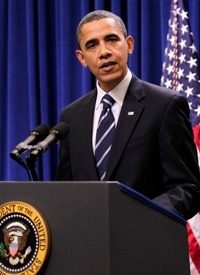
President Barack Obama held a live press conference Tuesday to announce the bipartisan compromise on the expiring Bush tax cuts. He also took the opportunity to target the Republican position on the tax cuts as detrimental to the middle class tax cuts, as well as accuse the Republicans of political maneuvering and obstructionism.
The compromise addressed in the press conference entails a two-year extension of the cuts in all income tax brackets in return for a Republican agreement to extend long-term unemployment benefits through next year. Likewise, the estate tax rate will be renewed, but at a lower rate than even during the Bush administration, and the administration is proposing a one-year payroll tax reduction that would reduce the Social Security tax rate from 6.2 percent to 4.2 percent.
President Obama began the conference by saying, “My number one priority is to do what’s right for American people, jobs, and economic growth.”
The President seemed to contend, however, that the Republicans did not maintain the same priorities. According to Obama, the Republicans were willing to allow the expiration of the middle class tax cuts in order to play “political games,” simply to secure tax cuts for the so-called “wealthy.”
He took the opportunity to accuse Republicans of seeking a protracted political fight, one in which he cannot afford to engage, as taxes are scheduled to increase on January 1, 2011 if a compromise is not made.
He claimed that because he could not get the Senate GOP “to budge,” he and the Democrats were forced to strike a deal.
Addressing his critics on the Left, Obama remarked, “If this is your position — that I have to go all in to the far Left on every issue, we’re never going to get anything done. We’ll have the satisfaction of purist positions and no victories for the American people.”
Overall, however, he asserts that the deal struck between the Democrats and Republicans is “good for the American people.”
On the other hand, President Obama felt compelled to add, “This is not as significant a boost to the economy as the recovery act was.” Asserting that unemployment may have gone up to 15 or 20 percent, Obama claimed that the passage of the Recovery Act was necessary to avoid another “Great Depression.” Of course, how more spending and more indebtedness can solve a problem created by too much government spending and indebtedness is never explained.
Instead, Obama stated, “What this package does is provide an additional boost to the economy. We may see faster growth and more job growth as a result of this package.”
Despite Obama’s implications of Republican obstructionism, Republican Senate leadership states that they appreciate the President’s willingness to compromise on the tax cuts.
House Republican Leader John Boehner said, “It’s encouraging that the White House is now willing to stop all of the job-killing tax hikes scheduled for January 1. We look forward to discussing this proposal with House Republican members and the American people.”
According to Republican John Thune from South Dakota, “The tax breaks hopefully … will get people in this country back to work.”
Thune adds that economic progress cannot simply end with tax cuts. “The second thing I think the American people want addressed is the issue of spending and debt. And I hope that before this conference adjourns that we can come to an agreement on spending that doesn’t increase spending.”
Democrats, however, are not entirely enthusiastic about the compromise. Senate Majority Leader Harry Reid has failed to issue a statement on the deal except to say that he “plans on discussing it with his caucus.”
Democratic Representative Peter Welch of Vermont commented, “We oppose acceding to Republican demands to extend the Bush tax cuts to millionaires and billionaires.”
Democrats have also articulated frustration with the renewal of the estate tax, which they assert should be higher.
While Senate Minority Leader Mitch McConnell asserts that the compromise is a done deal, some Democrats are still threatening to vote against it. More than likely, however, Americans will see this deal passed and the tax cuts extended, at least for the next two years.
While the Left bemoans the supposed addition of $900 billion to the national debt as a result of the tax cuts (a mathematic impossibility, as an extension of the tax cuts simply means the government will continue to let wage-earners keep their own money), none seems to be opposed to the addition of $60 billion to the deficit, since unemployment benefits are actually paid out of the public treasury.
Photo of Barack Obama: AP Images




